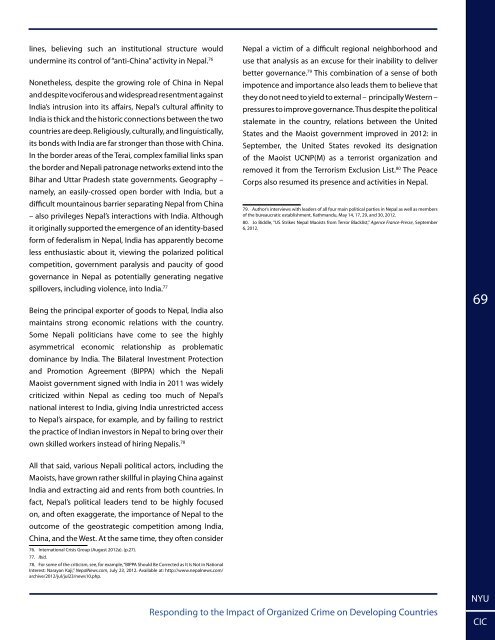here - Center on International Cooperation - New York University
here - Center on International Cooperation - New York University
here - Center on International Cooperation - New York University
Create successful ePaper yourself
Turn your PDF publications into a flip-book with our unique Google optimized e-Paper software.
lines, believing such an instituti<strong>on</strong>al structure would<br />
undermine its c<strong>on</strong>trol of “anti-China” activity in Nepal. 76<br />
N<strong>on</strong>etheless, despite the growing role of China in Nepal<br />
and despite vociferous and widespread resentment against<br />
India’s intrusi<strong>on</strong> into its affairs, Nepal’s cultural affinity to<br />
India is thick and the historic c<strong>on</strong>necti<strong>on</strong>s between the two<br />
countries are deep. Religiously, culturally, and linguistically,<br />
its b<strong>on</strong>ds with India are far str<strong>on</strong>ger than those with China.<br />
In the border areas of the Terai, complex familial links span<br />
the border and Nepali patr<strong>on</strong>age networks extend into the<br />
Bihar and Uttar Pradesh state governments. Geography –<br />
namely, an easily-crossed open border with India, but a<br />
difficult mountainous barrier separating Nepal from China<br />
– also privileges Nepal’s interacti<strong>on</strong>s with India. Although<br />
it originally supported the emergence of an identity-based<br />
form of federalism in Nepal, India has apparently become<br />
less enthusiastic about it, viewing the polarized political<br />
competiti<strong>on</strong>, government paralysis and paucity of good<br />
governance in Nepal as potentially generating negative<br />
spillovers, including violence, into India. 77<br />
Being the principal exporter of goods to Nepal, India also<br />
maintains str<strong>on</strong>g ec<strong>on</strong>omic relati<strong>on</strong>s with the country.<br />
Some Nepali politicians have come to see the highly<br />
asymmetrical ec<strong>on</strong>omic relati<strong>on</strong>ship as problematic<br />
dominance by India. The Bilateral Investment Protecti<strong>on</strong><br />
and Promoti<strong>on</strong> Agreement (BIPPA) which the Nepali<br />
Maoist government signed with India in 2011 was widely<br />
criticized within Nepal as ceding too much of Nepal’s<br />
nati<strong>on</strong>al interest to India, giving India unrestricted access<br />
to Nepal’s airspace, for example, and by failing to restrict<br />
the practice of Indian investors in Nepal to bring over their<br />
own skilled workers instead of hiring Nepalis. 78<br />
Nepal a victim of a difficult regi<strong>on</strong>al neighborhood and<br />
use that analysis as an excuse for their inability to deliver<br />
better governance. 79 This combinati<strong>on</strong> of a sense of both<br />
impotence and importance also leads them to believe that<br />
they do not need to yield to external – principally Western –<br />
pressures to improve governance. Thus despite the political<br />
stalemate in the country, relati<strong>on</strong>s between the United<br />
States and the Maoist government improved in 2012: in<br />
September, the United States revoked its designati<strong>on</strong><br />
of the Maoist UCNP(M) as a terrorist organizati<strong>on</strong> and<br />
removed it from the Terrorism Exclusi<strong>on</strong> List. 80 The Peace<br />
Corps also resumed its presence and activities in Nepal.<br />
79. Author’s interviews with leaders of all four main political parties in Nepal as well as members<br />
of the bureaucratic establishment, Kathmandu, May 14, 17, 29, and 30, 2012.<br />
80. Jo Biddle, “US Strikes Nepal Maoists from Terror Blacklist,” Agence France-Presse, September<br />
6, 2012.<br />
69<br />
All that said, various Nepali political actors, including the<br />
Maoists, have grown rather skillful in playing China against<br />
India and extracting aid and rents from both countries. In<br />
fact, Nepal’s political leaders tend to be highly focused<br />
<strong>on</strong>, and often exaggerate, the importance of Nepal to the<br />
outcome of the geostrategic competiti<strong>on</strong> am<strong>on</strong>g India,<br />
China, and the West. At the same time, they often c<strong>on</strong>sider<br />
76. Internati<strong>on</strong>al Crisis Group (August 2012a). (p.27).<br />
77. Ibid.<br />
78. For some of the criticism, see, for example, “BIPPA Should Be Corrected as It Is Not in Nati<strong>on</strong>al<br />
Interest: Narayan Kaji,” Nepal<strong>New</strong>s.com, July 23, 2012. Available at: http://www.nepalnews.com/<br />
archive/2012/jul/jul23/news10.php.<br />
Resp<strong>on</strong>ding to the Impact of Organized Crime <strong>on</strong> Developing Countries<br />
NYU<br />
CIC
















